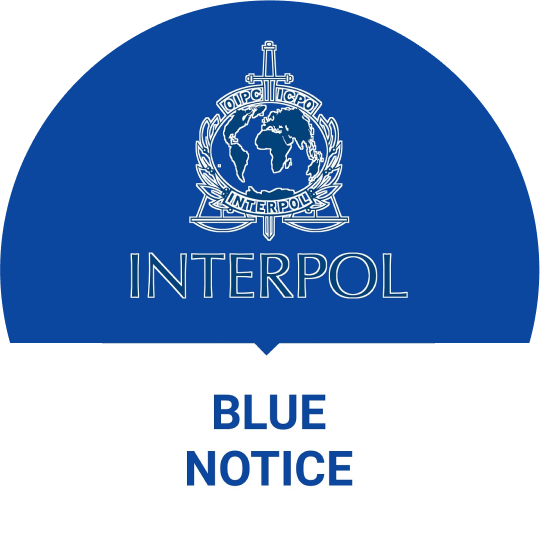
Interpol blue notices are issued to gather information on individuals suspected of involvement in a crime or possessing crime-related knowledge. These notices help in identifying the suspect, their criminal activities, or whereabouts, aiding Interpol and authorities in tracking and investigating. For example, a Blue Notice might be requested to obtain data on a citizen suspected of complicity in crimes.


The International Criminal Police Organization (Interpol), formed in 1923, is an intergovernmental organization that collaborates to prevent and combat global crime. It issues international alerts, or notices, to assist in apprehending criminals and combating criminal activities.
There are eight types of Interpol notices, including the blue notice. Typically, each Interpol member country has a National Central Bureau (NCB) that sends critical crime information notice requests to Interpol’s General Secretariat so that they can be published on Interpol’s website.
 Interpol Blue Notices
Interpol Blue NoticesA blue notice from Interpol can lead to surveillance and tracking. While it has a similar function to a red notice, it differs because it can be issued before criminal charges are filed. After issuing a blue notice, Interpol may request assistance from member countries:
 Dealing with an Interpol Blue Notice can be challenging and significantly affect your personal and professional life, leading to surveillance, stress, and legal issues. Professional help is advisable.
Dealing with an Interpol Blue Notice can be challenging and significantly affect your personal and professional life, leading to surveillance, stress, and legal issues. Professional help is advisable.
Our experienced Interpol Blue Notice Lawyers specialize in removing Blue Notices. We provide guidance to challenge and potentially remove a Blue Notice against your name.
The process begins with a thorough evaluation of the Blue Notice, assessing its validity and conformity with Interpol’s regulations. Our legal experts will then devise a strategic plan to argue your case effectively, emphasizing any inaccuracies or inconsistencies in the notice, if applicable.
We liaise directly with the Commission for the Control of Interpol’s Files (CCF) on your behalf, ensuring a structured and persuasive representation of your case. Throughout this challenging time, our Interpol Blue Notice Lawyers will stand by your side, providing expert legal advice and constant support.
With our specialized assistance, you can confront the Blue Notice Interpol with confidence, mitigating its potential impact on your life. Trust us to help you navigate this complex process and fight for your rights.

 The Commission for the Control of Interpol’s Files (CCF) is in charge of receiving notice requests from NCBs of Interpol member states. It ensures they meet legal requirements before entering them into Interpol’s databases.
The Commission for the Control of Interpol’s Files (CCF) is in charge of receiving notice requests from NCBs of Interpol member states. It ensures they meet legal requirements before entering them into Interpol’s databases.
The Commission for the Control of Interpol’s Files (CCF) handles notice requests from National Central Bureaus (NCBs) of Interpol member states, ensuring legal compliance before adding them to Interpol’s databases. Key criteria include non-involvement in military, religious, political, or racial matters, respecting human rights as per Article 2 of Interpol’s Constitution, and having adequate information about the wanted person.
Anyone subject to Interpol’s notices is considered innocent until proven guilty. When challenging these notices, you must use Interpol’s four official languages, i.e., English, Spanish, Arabic, and French.
An Interpol Blue Notice is issued to identify or gather information about a person involved in a criminal investigation. The Blue Notice list includes individuals suspected of crimes. Understanding how these notices function and your rights if targeted is essential, particularly if an arrest warrant is issued against you. In such cases, seeking legal assistance is advisable due to the complexities of Interpol law.
